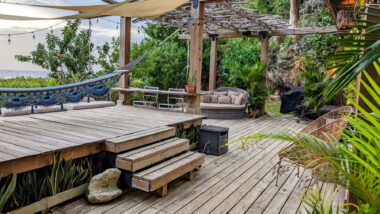Do-overs are fundamental to our experience as people and patients
Redoing a vacation — this time, without a fall or a broken foot
Written by |

“’Hang on a sec, hon,’ I called to my husband in the car, at the airport, and again on the plane. ‘I want to get a good shot. I’m sure something from this trip will work its way into my next column.’”
That’s how I started my column one year ago this week. And because I just got back from my do-over vacation, it seemed only fitting to begin a do-over column the same way.
Last year, my husband and I went to Puerto Rico for Thanksgiving. We stayed in a private paradise on the beach, literally steps away from the water. But after just one day, I couldn’t take any of those steps. I fell on day two, breaking my foot for the second time in as many years. I couldn’t go in the water. I couldn’t walk on the sand. We made the best of the situation, but decided we needed a do-over.
We booked the same Airbnb for the same week this year, and I had one main goal: Do not break my foot again.
I didn’t want to risk offending the do-over gods and jinxing myself into a be-careful-what-you-wish-for loophole, so I had to choose my words carefully.
Do not break my foot again. Wait — do not break any bone. No — do not get hurt at all. Either of us. Please.

Kerry’s nemesis: the platform stairs she revisited after falling last year. (Photo by Kerry Wong)
When we arrived, I glared at the steps I’d fallen from a year ago, hoping my determination would be stronger than my fear. I put one foot on the first step, holding on to my husband for support, but couldn’t lift myself up. I tried again with the other foot, but couldn’t reach the step at all.
Eventually, I was able to sit on the platform and bring my legs around, then roll over onto a cushion and push myself up from all fours. It wasn’t a traditional way to get up three stairs, and it certainly wasn’t pretty, but it worked. I stood on the deck, lay on the hammock, and maneuvered my way back down. Then I celebrated my victory.
The power of do-overs
Though it started with a simple mission to make up for last year’s fall, this do-over trip turned into so much more. It was a beautiful, peaceful, romantic, fun, and delicious vacation filled with sunsets, smiles, laughs, love … and mofongo. Lots of mofongo.
We’re on a roll now, with do-over trips to Hawaii and California in the works for 2024 and 2025. If you think about it, that’s what we do with most things in life. We learn from our experiences, and as the saying goes, when we know better, we do(-over) better. That’s why sports have practices, shows have rehearsals, and writers have drafts and revisions.
Do-overs are fundamental to our experience as patients, too, though that’s not always our choice.
By definition, sarcoidosis, which I have, is a diagnosis of exclusion. There isn’t one textbook presentation, and no gold standard test makes it conclusive, so it becomes a bit of an educated guessing game. Doctors review our symptoms, run some tests, give us a diagnosis, and prescribe a treatment. It’s not quite that simple, though, as the initial diagnosis isn’t always accurate, and the initial treatment doesn’t always help.
So doctors get a do-over. They may run a different test, consider a different diagnosis, or prescribe a different treatment — or all of the above. It can take years of do-overs (misdiagnoses and failed treatments) before they identify sarcoidosis as the underlying cause of our symptoms, and even longer to find the best course of treatment.
What we must remember, though, is that our doctors’ do-overs aren’t really theirs. These are our bodies, our symptoms, our diagnoses, and our treatments. That means these are our do-overs to ask for. And we have every right to ask for them.
If we don’t get the relief we need or if we develop side effects we don’t want to live with, we can ask for a do-over. That may be a change in dosage or method of administration (oral vs. injectable methotrexate, for example), or a new medication altogether.
We deserve a do-over if a doctor dismisses our symptoms, concerns, experiences, or wishes. We owe it to ourselves to find healthcare providers who listen, believe what we say even when it’s not reflected in lab reports, and treat us with respect.
Life — especially life with sarcoidosis — doesn’t always give us do-overs, so it’s up to us to create them ourselves. When things don’t go our way, whether medically, professionally, or even “vacationally,” resilience, perseverance, and creativity can lead us to greater joy than we can imagine.
Note: Sarcoidosis News is strictly a news and information website about the disease. It does not provide medical advice, diagnosis, or treatment. This content is not intended to be a substitute for professional medical advice, diagnosis, or treatment. Always seek the advice of your physician or other qualified health provider with any questions you may have regarding a medical condition. Never disregard professional medical advice or delay in seeking it because of something you have read on this website. The opinions expressed in this column are not those of Sarcoidosis News or its parent company, Bionews, and are intended to spark discussion about issues pertaining to sarcoidosis.







Tabone Mary
Kerry, you always make my day ! I’ve been contemplating another opinion for a long time….. You are my motivation. Thanks 💜💜💜
Paul Varadi
Enjoyed your article thanks!
🦋 Kerry Wong
Thank you, Paul! I appreciate your support.
~🦋